"Political Medicine" by Johann Lestok
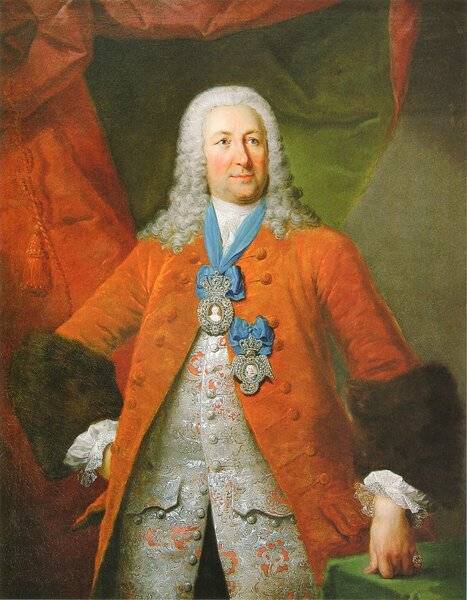
Georg Grooth. "Portrait of Count Johann Hermann Lestok" from the collection of J. I. Weizmann, Munich
State or palace coups are not at all rare in the world. stories. The conspirators are most often led by some general or an ambitious politician. However, rebellions sometimes occur, in which people of completely peaceful and least expected professions play a huge role.
A striking example is the palace coup on November 25, 1741, as a result of which the daughter of Peter I, Elizabeth, came to power. She did not have a “party” at court and authority among the highest dignitaries of the state, she did not have “her own people” at the head of the St. Petersburg guards regiments. The resources for the coup were, in general, simply insignificant: a doctor by profession, but an intriguer and adventurer by vocation, Johann Lestok, a handful of ordinary guardsmen of the first company of the Preobrazhensky Regiment and extremely dangerous (personally for Elizabeth) financial support from Sweden (which then fought with Russia) and her allied France - that's all that Elizabeth had.
On the side of her opponent, Anna Leopoldovna, was all the might of the Russian Empire and many well-wishers who tried disinterestedly and not very much to inform the ruler about the ripening conspiracy. Anna Leopoldovna, of course, greatly facilitated her rival's path to the throne, demonstrating simply amazing frivolity and carelessness. The most surprising thing is that in Elizabeth's assessment, she was, in general, right: this princess seemed simply incapable of serious independent intrigue. But the ruler did not take into account the influence of extraneous forces and underestimated the court physician Lestocq - a man of no nobility and who seemed completely insignificant. Anna Leopoldovna's entire family had to pay for the tragic mistakes of Anna Leopoldovna, for whom the "meek and gentle" Elizabeth prepared a truly terrible fate.
The origin and youth of the hero of the article
Johann Hermann Lestok, being French by nationality, was born in 1692 in Lüneburg, Germany. The fact is that his Protestant father chose to leave Catholic Champagne for Lutheran Hannover. Here he managed to get the position of court surgeon at the local duke. The future "gray eminence" Elizaveta Petrovna was the middle of three sons in this family. His father was a nobleman, but he could not boast of either nobility or wealth. It is not even known whether he had a medical education or was self-taught. Parents pinned their main hopes on Johann Paul, the eldest of their sons. He was sent to Paris and achieved some success, he was even credited with a relationship with the Duchess Françoise-Marie of Orleans, the illegitimate daughter of Louis XIV. And the middle son, Johann Hermann, due to lack of funds, could not enter the university and receive a medical degree. He was taught medical science by his father, who hoped to pass on to his son his position as a medical doctor at the court of a petty German prince. However, Johann Hermann himself tried to fill in the gaps in his knowledge by collecting a large medical library.
Some researchers believe that the uneducated Lestok was a weak doctor who used his patients not so much with pills and potions as with "kind words" and amusing anecdotes. However, given the level of medicine of that time, it should be recognized that the personality and authority of the doctor were then much more important than the medicines he made. It was simply impossible to cure serious diseases with medicines that were used by doctors of the XNUMXth century. However, "blind" placebo-controlled studies provide irrefutable evidence that pacifiers that do not contain active ingredients have a very pronounced positive effect on the human body, sometimes competing in effectiveness with real drugs prescribed in a parallel group of patients. And therefore, despite all the apparent progress, medicine is still largely an art, not a science. In the treatment of a number of diseases, even today, the main success factor is not the literal fulfillment by the doctor of all the points of the "clinical recommendations", but the patient's trust in his doctor and the treatment he prescribes.
As we remember, Lestocq's older brother achieved some success in Paris. The grown-up Johann Hermann went to him, but the experience of metropolitan life turned out to be unsuccessful: for unclear reasons, the self-taught doctor spent a whole year in Chatelet Castle, which was considered a prison for state criminals. However, this experience did not discourage him from political intrigues.
After leaving prison, Lestok was able to get a job as a surgeon in one of the French regiments. But service in it did not promise any particular success, and therefore in 1713 Lestok decided to take a chance by offering his services to Russian agents who were recruiting specialists in Europe.
Lestok in the service of Peter I
Johann Lestok, as we remember, did not have a medical degree. Nevertheless, in a personal meeting, he made a good impression on Peter I, who considered himself an expert on many issues, including medicine. Satisfied with the conversation, the tsar ordered Lestok to be accepted into the Russian service, and of the seven doctors invited to Russia at that time, it was Lestok who was appointed to the court. In St. Petersburg, Johann German became Ivan Ivanovich, and his last name was often pronounced as Leshtuk.
This Frenchman, apparently, was an extremely charming person and knew how to please people. It is no coincidence that in 1716-1717. we see him among the courtiers who accompanied Peter I and Catherine on their journey through Europe. It was then that Lestok attracted the attention of the future empress, and also became friends with Pavel Yaguzhinsky and court marshal Dmitry Shepelev.
Lestocq's career at court came to an abrupt end in April 1719 after a conflict with the royal jester Lacoste. The real name of this man is Jan d'Acosta, he came from a family of Marranos (Portuguese Jews who were forcibly converted to Christianity) and was born in North Africa, from where he moved to Hamburg.
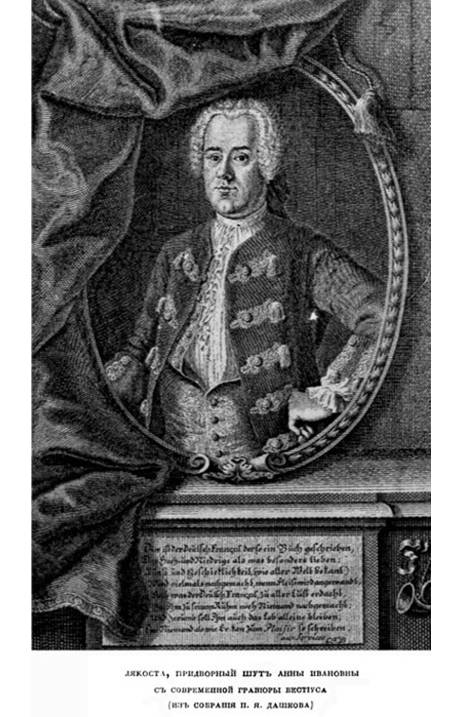
Jan d'Acosta
Here, either in 1712 or in 1713, he met with Peter I and attracted his attention, on the one hand, by his broad education and knowledge of 6 languages, on the other hand, by his awkward figure. As a result, he ended up in Russia as a court jester. Together with Peter I, he chopped off the beards of the boyars and cut the hems of the caftans, which, of course, was an additional humiliation for the representatives of the old aristocracy. The king appreciated Lacoste very much, and even awarded him the clownish title of "Samoyed King", after which he, without hesitation, began to wear a tin crown. After the death of Peter I, Lacoste ended up in exile in the Arkhangelsk province, but then, with the coming to power of Anna Ioannovna, already at the age of 65, he continued his clownish career at the court of this empress.
This is how we see Lacoste in the painting by V. Jacobi “Morning in the Palace of Anna Ioannovna”:
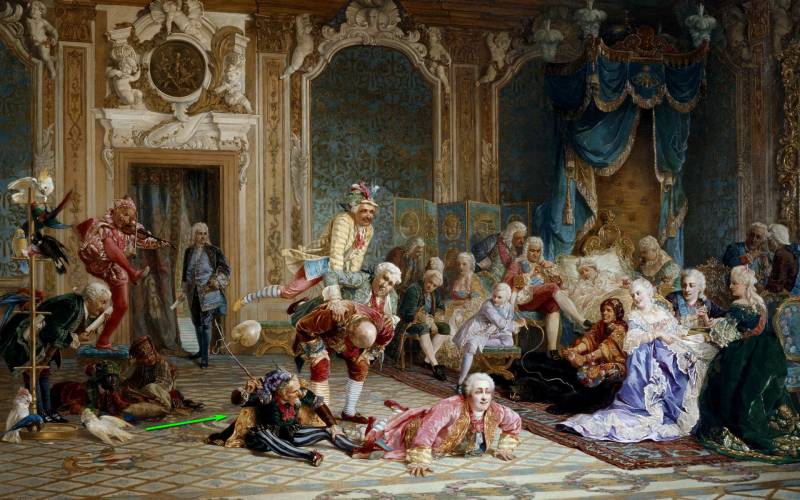
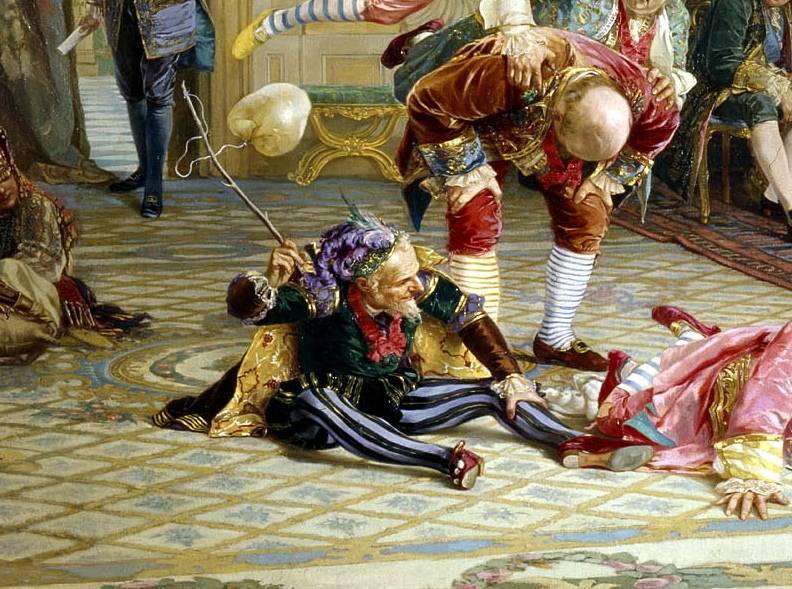
Lestok in 1719 managed to "spin an affair" with Lacoste's wife and his three daughters.
I must say that this Frenchman apparently had no problems with potency, but with reproductive function, the situation was probably much sadder. Lestok was married to three women - Barbara von Ruthenhjelm, Alida Müller and Maria Aurora von Mengden, but had no children from any of them.
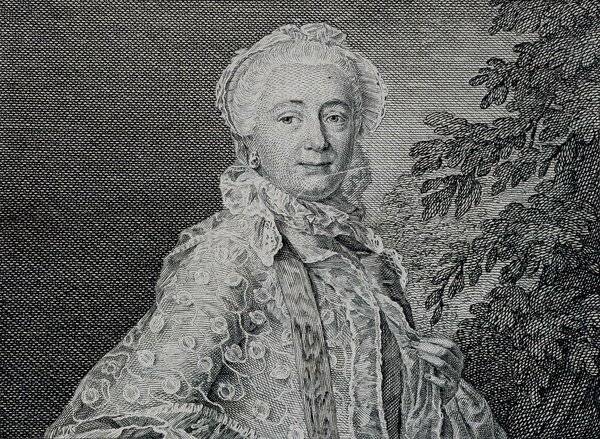
Maria Aurora Lestok, née von Mengden
But back to Lacoste and his family. Lestok seduced at least one of the jester's daughters, everything ended in a noisy scandal and a fight. It came to the king, who sided with Lacoste. Lestok was in custody for 4 months, after which he was deported to Kazan, where he was entitled to a considerable annual allowance of 240 rubles, and medical practice was also allowed.
Life physician of Princess Elizabeth
Lestok returned to St. Petersburg after the accession to the throne of Catherine I. The new empress even appointed him a life doctor for her daughter Elizabeth, which ultimately led to huge consequences for the history of our country. But before that it was still far away. In the meantime, as many believe, it was Lestok who wrote the denunciation of Elizabeth's lover, Alexei Shubin, who was exiled to Kamchatka. The fact is that the princess then fell in love seriously (she even wrote poems dedicated to Shubin), and the new favorite of Elizabeth began to exert too much influence on her. At this time, Lestok had a reputation as a useful (but also dangerous) person with his wit, and many influential people from among the courtiers of Empress Anna Ioannovna turned to him for help. It is known that Lestok not without compensation acted with his witticisms, which quickly diverged in the world, in favor of the Bestuzhev clan, Artemy Volynsky, and even Princess Anna, sister of Elizabeth.
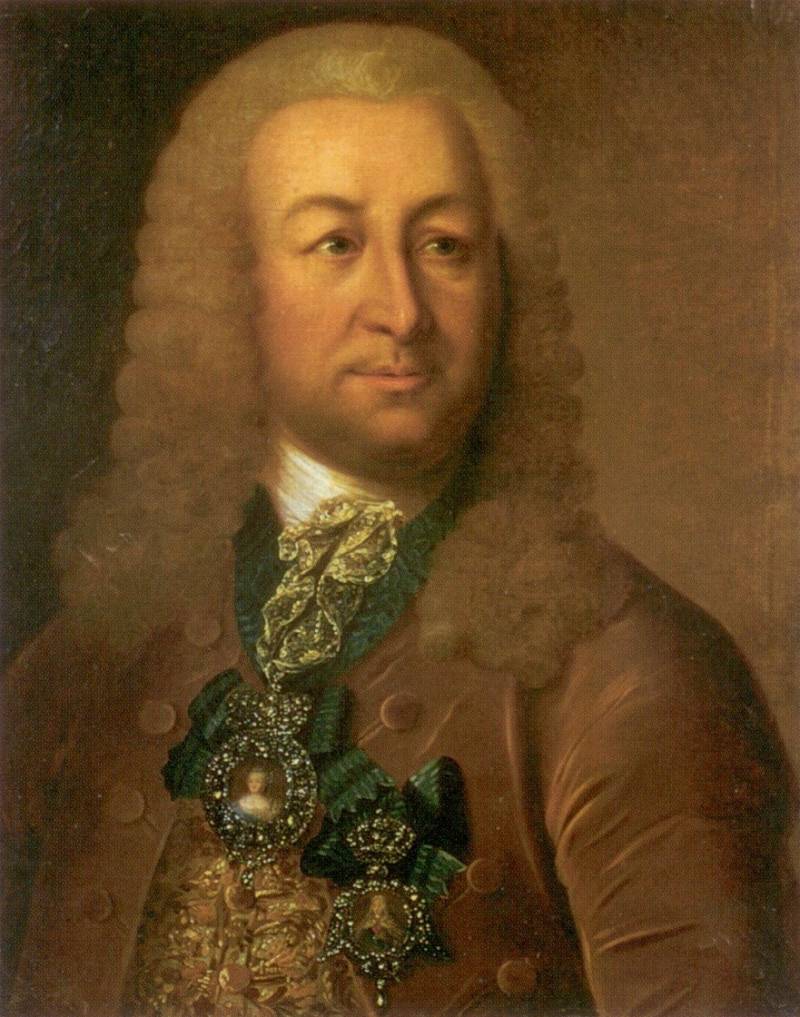
Johann Hermann Lestok, copy of a portrait by G.K. Groot, 1740s.
Conspiracy
Louis XV and his government for too long paid no attention to affairs in distant Russia. However, the War of the Polish Succession of 1733-1735, in which the pro-Russian candidate Frederick August II of Saxony won, and Louis XV's father-in-law Stanislav Leshchinsky was forced to flee after the defeat of the French landing at Danzig, made the French realize the fallacy of their position. To correct the situation, Jacques-Joachim Trotti, Marquis de la Chetardie, was sent, who, according to one version, addicted Russian aristocrats to champagne - before him they managed with Hungarian wine. The marquis arrived in Petersburg in 1739.
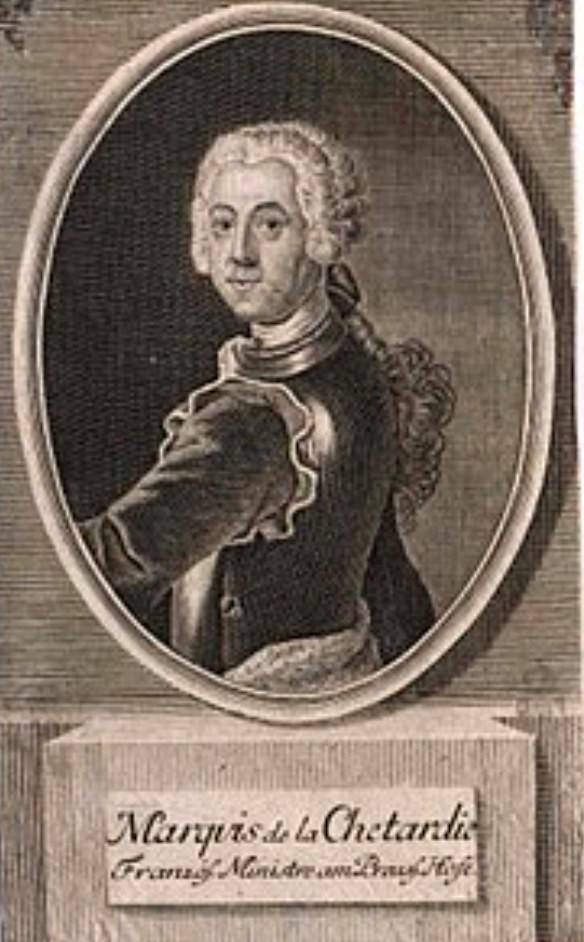
Jacques-Joachim Trotti, marquis de la Chetardie
In order to turn Russia's policy in a different direction, he decided to bet on the daughter of Peter I, Elizabeth, who, firstly, was almost the only one at court who felt sympathy for France, and secondly, like her nephew, Peter II, was considered a fan "old orders". Chétardie hoped that, having come to power, Elizabeth would move the capital back to Moscow and would not interfere in European affairs. The problem was that this princess had practically no influence at the court, where she was in the position of almost a host. The only person who felt sympathy for the daughter of Peter I was the favorite of Anna Ioannovna Biron, who supported her financially and periodically paid her debts. The fall of Biron did not bring Chétardy closer to the goal, although it somewhat improved the position of Elizabeth at court, since the new ruler of Russia, Anna Leopoldovna, was a kind woman and tried to maintain good relations with all her relatives.
Under these conditions, Chétardie decided to take the side of Sweden, where revanchist sentiments were strong and the victory, in the end, was won by the “battle hat party”. And on July 28 (8) August 1741, a new Russian-Swedish war began, in which the Russian troops again won, this time led by Field Marshal Peter Lassi. Chétardie and the Swedish ambassador to St. Petersburg, Eric Matthias von Nolken, opened a “second front” in the Russian capital, establishing contact with Princess Elizabeth through Lestok. They promised her help in ascending the throne, demanding in return "mere little" - the provinces conquered by her father during the Great Northern War. The Swedes even announced that their country entered the war as a defender of the rights to the Russian throne of Elizabeth Petrovna. And they accused the government of Anna Leopoldovna of "foreign oppression and inhuman tyranny ... of the Russian nation».
The financing of the conspiracy went through Lestocq, who in Chétardie's reports was described as a "brave friend" agent and himself received a "pension" of 15 livres from the French treasury.
The activity of the ambassadors of hostile states and Lestocq did not go unnoticed. Information about a brewing conspiracy came to Anna Leopoldovna from all sides. Even her beloved man, Moritz Linar, advised the ruler to send Elizabeth to a monastery and expel Chétardie from the country. Experienced Osterman suggested taking action. Anna was not even heard by the desperate appeal of the Austrian ambassador Marquis de Botta:
Chief Marshal Reinhold Gustav Lowenwolde tried to save Anna on the eve of the coup. After reading his note, the ruler said:
Anna forbade her husband, who became Generalissimo, Anton Ulrich, to set up pickets on the streets of the capital. The only thing she did then was to speak frankly with Elizabeth, revealing all her "cards" and actually provoking her to take decisive action. Elizabeth easily convinced the ruler of her loyalty, but after this conversation, Lestok realized that there was no longer any possibility of delaying the coup. Taking a playing card of a red lady, he used the image on it as portraits of Elizabeth, depicting her on one side as a nun, on the other - as an empress.
The conspirators were involuntarily helped by the actions of their opponents, who announced that the guards were preparing to leave the capital - to go to war with Sweden. The blooming guardsmen did not expect such a "blow" from the authorities and could not forgive. They had long been accustomed to unpunished debauchery in the taverns and brothels of St. Petersburg, and the very idea of the need to leave these cozy establishments and go to war, where they would have to risk their lives, seemed blasphemous to them. Meanwhile, the entire first company of the Preobrazhensky Regiment had long been lured by Elizabeth with Swedish and French money. It was to them that Lestok and Elizabeth went on the night of November 25, 1741. A popular legend says that Elizabeth then addressed the guardsmen in this way:
We can safely say that this is a late historical myth. In 1741, such a reference to Peter I could rather play against Elizabeth: in Russian society in the middle of the XNUMXth century, the authority of this emperor, who, according to Klyuchevsky, “to protect the fatherland from the enemy, devastated it more than any enemy' was extremely low. The people of Peter I openly called the Antichrist and the "Aggel of Satan", and the representatives of the "old nobility" treated Peter and the results of his activities without enthusiasm. The time of honoring Peter I was ahead, and the attitude towards him began to change only under Catherine II, who carefully emphasized that she was the successor to the course of the first emperor. Finally, the cult of Peter I took shape only in the time of Pushkin. Preobrazhensev did not need to agitate that night: the guardsmen loyal to Elizabeth had been waiting for such an order for a long time, realizing that the princess could be in the monastery at any moment, and they could be in Siberia. Since the already overweight “daughter of Petrov” (who at that moment was only 32 years old) could not walk quickly, the Preobrazhenians picked her up and carried her to seize power.
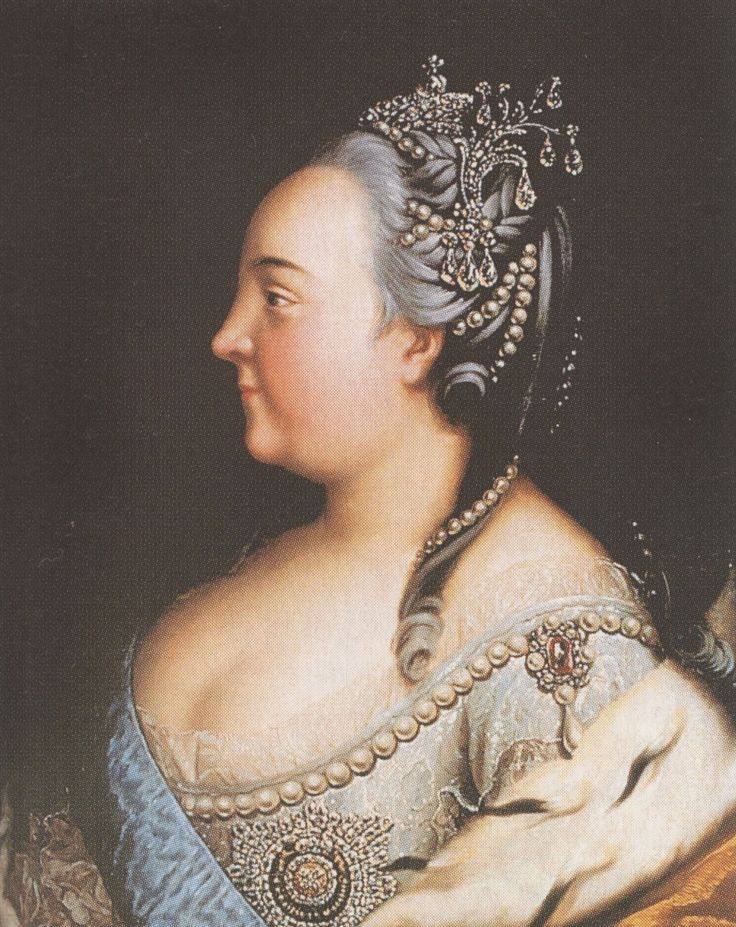
G. Buchholz. Elizaveta Petrovna in pearls
There were 308 of these guardsmen, later they became the infamous life company for their rampages.
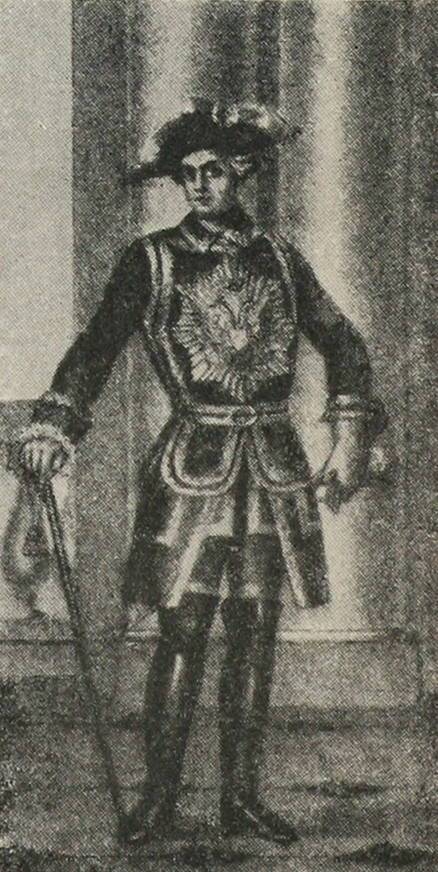
Officer of the Life Company in cavalry attire. Engraving. 1742-1762
Peter III saved the capital from the atrocities of these Praetorians, ordering them to be sent to the villages donated by the grateful Elizabeth.
But back to 1741. The Brunswick family was arrested, and their fate was terrible. The Saxon envoy Petzold, expressing the general opinion of foreign diplomats, then said:
Lestok at the peak of his career
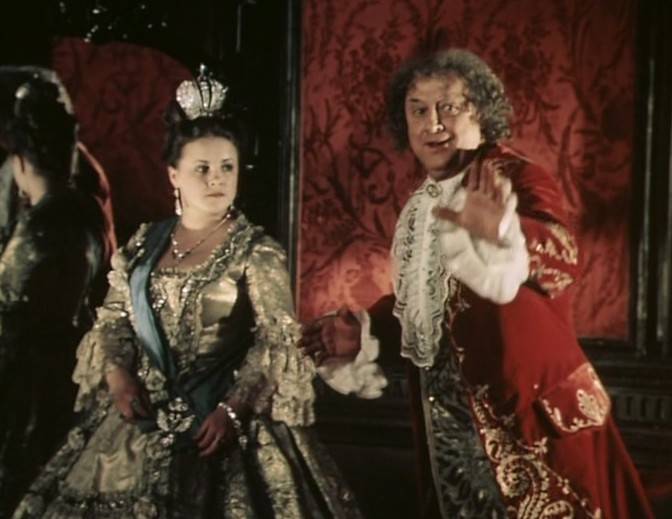
This is how Elizabeth and Lestok were seen by viewers of the series “Midshipmen, forward!”
The very next day after the coup, Lestok became a Privy Councilor, "the first life physician and chief director of the Medical Office and the entire Medical Faculty". At the same time, he still received a very significant payment, as the attending physician of the Empress. The following entry has been preserved in the archives:
Five thousand rubles for a one-time bloodletting procedure! But even this was not enough for Lestok, he continued to receive a "pension" from the French, whose interests he lobbied hard. He did not disdain money from the Prussian ambassador, who in one of his letters to Frederick II called him "such a zealous servant of your majesty, as if he were in your service". As a result, at the request of Frederick Lestok, he also received the title of Count of the Holy Roman Empire from the Austrian Emperor Charles VII.
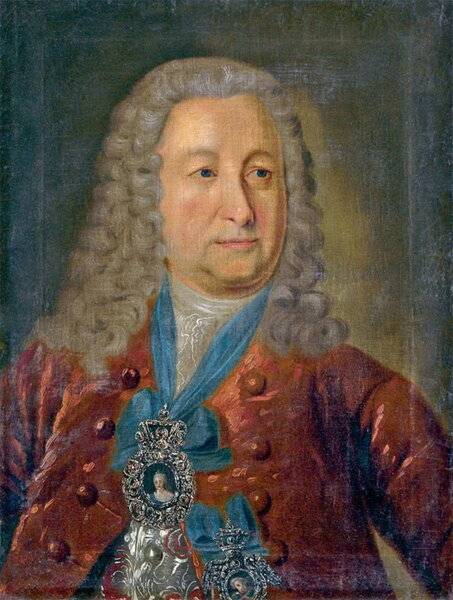
Unknown artist. "Portrait of Count Johann Hermann Lestok", State Vladimir-Suzdal Museum-Reserve
Shortly before the disgrace, Elizabeth gave Lestok a plot of land on the left bank of the Fontanka to build a dacha. In the 80s of the 1851th century, a passage was laid here, called Lestokov. Later it turned into Leshtukov lane (officially this name was assigned to it in 1907). The name could not be kept, and now the lane bears the name of Dzhambul. But the name of Lestok is kept by the Leshtukov Bridge, which connected Spassky and Nameless Islands, which was built in XNUMX.

Leshtukov bridge
The Marquis of Chétardie was not bypassed with awards, who, departing for his homeland, in September 1742 was awarded by Elizabeth the Order of St. Andrew the First-Called - the highest order of the Russian Empire. In 1743, Chetardie, at the request of the Russian Empress, was again sent as an ambassador to St. Petersburg, but this time he failed his mission.
Opal by Johann Lestock
Chancellor A. Bestuzhev-Ryumin, who advocated an alliance with England and Austria and did not want rapprochement with France, became a political opponent of Lestocq and Chétardie. The degree of his competence and qualifications can be judged by the fact that he confused matters so much that as a result, in the Seven Years' War, Russia suddenly found itself an ally of France and an opponent of England. However, Bestuzhev was good at court intrigues, and in 1744, at the right moment, slipped the intercepted letters of Chétardie to Elizabeth, from which it followed that the former friend of the empress was playing his game, and her life doctor was acting exclusively in the interests of France. Chétardie was expelled from Russia, and Lestok lost his influence over Elizabeth.
Lestok did not accept defeat and in 1747 found another ally - the Prussian ambassador Fink von Finkenstein. But in 1748, Bestuzhev again intercepted Lestocq's letters, and this time the Frenchman was arrested and interrogated "with partiality." By order of Bestuzhev, testimony was beaten out of the life physician in malice on the life of Elizabeth, but it was not possible to accuse him of a new conspiracy. Nevertheless, Lestok had to see from personal experience what the gratitude of Elizabeth, whom he had recently actually elevated to the Russian throne, was worth. By order of the Empress, he was exiled to Uglich, and then transferred to Veliky Ustyug, where he lived practically in poverty, barely making ends meet. In total, his disgrace lasted 13 years - until the death of Elizabeth. In 1762, he, like many other political prisoners, was amnestied by Peter III and returned to St. Petersburg. Even the confiscated property was returned to him. At this time, Lestok was already 70 years old, but Princess Dashkova recalled that, despite the hardships of the last years of his life, the old doctor retained a cheerful disposition and wit.
Johann Lestok died in 1767 at the age of 75.
Information